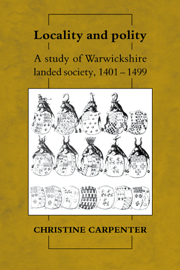Book contents
- Frontmatter
- Contents
- List of figures and tables
- Preface
- List of abbreviations
- Note on text
- 1 Introduction
- PART I STRUCTURAL
- 2 Geography, economy and regional identity
- 3 Who were the gentry?
- 4 Social mobility and the creation of estates
- 5 The exploitation of estates
- 6 Expenditure and dispersal
- 7 Conclusions: land, family and lineage
- 8 The local officers
- PART II CHRONOLOGICAL
- Appendices
- Bibliography
- Index
7 - Conclusions: land, family and lineage
Published online by Cambridge University Press: 27 October 2009
- Frontmatter
- Contents
- List of figures and tables
- Preface
- List of abbreviations
- Note on text
- 1 Introduction
- PART I STRUCTURAL
- 2 Geography, economy and regional identity
- 3 Who were the gentry?
- 4 Social mobility and the creation of estates
- 5 The exploitation of estates
- 6 Expenditure and dispersal
- 7 Conclusions: land, family and lineage
- 8 The local officers
- PART II CHRONOLOGICAL
- Appendices
- Bibliography
- Index
Summary
A large part of this opening section has revolved around land, its significance and the uses to which it was put. It will be obvious already that landed property in this period was far more than an economic commodity. To a large extent the possession of land defined a gentry family as a political and social entity. Land might therefore be sacrificed for political or social benefits, particularly in marriage settlements. It might be pursued in expensive litigation that cost far more than the property was worth. Its income might be allowed to fall to avoid offending important tenants or officials. Expenditure of its profits alone did not make a family great; one that spent beyond its social position was regarded with contempt. That the purpose of land went far beyond pecuniary profit is apparent from Margaret Paston's comment: ‘money is sone lost and spent whan yat lyfelode abideth’. That it was land alone that counted can be seen in the instructions in the will made in 1500 by John Smyth, a lawyer who had taken his family into the ranks of the gentry, to his son, Henry, who was fast growing rich in the livestock boom of the late fifteenth century. It seems that John had some doubts about the effect of his son's entrepreneurial instincts on the family's position. Henry was told that the money his father would leave him was to be used neither to settle his father's debts nor to buy sheep or cattle, but only to purchase land for himself and his heirs.
- Type
- Chapter
- Information
- Locality and PolityA Study of Warwickshire Landed Society, 1401–1499, pp. 244 - 262Publisher: Cambridge University PressPrint publication year: 1992
- 1
- Cited by



